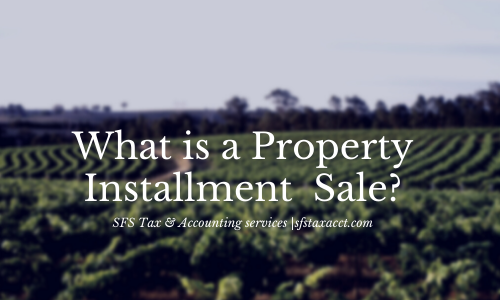Using an Installment Sale to Help Sell Real Estate and What to Look Out For
You may be able to benefit from a tax deferral if you use an installment sale to sell a property and may even lower your tax bill. However, there is much to consider as specific “tax traps” to look out for.
An installment sale is:
You create an installment sale when you receive payments for sold real estate in the tax year of the sale and at least one other tax year. For example, if you sell a property for a profit in 2021 and receive payments in 2021 through 2026, your real estate transaction is an installment sale.
What are the tax implications of this transaction?
- An installment sale creates a tax event in each year you receive payments. In the above example, part of your gain is taxable in 2021 and each year through 2026.
- Property held longer than one year qualifies for favorable long term capital gains tax treatment. The current tax rate on long-term capital gains is from 0 to 20 percent (subject to change, per the rumors swirling out there), compared with the top ordinary income tax bracket of 37 percent.
- You must treat this under the installment sale rules unless you elect to pay all the tax due on the sale up-front to avoid paying tax on the installments in future years. Thus, in some instances, you’ll reduce your overall tax bill, though it may require some help with tax planning. But, again, consult with your Enrolled Agent or tax pro on this matter.
- As a side note, interest on the installment (and it has to have interest at a market rate) is included in the year earned. So it is only the principle that spread over the years using a complex formula.
What are the benefits of an installment sale?
- With an installment sale, you may be able to lower your total tax on the sale of the property by spreading this income out over several years.
- Additionally, the buyer will often pay a rate of interest to you higher than a typical bank loan for the remainder of the amount due.
So, what are the tax traps?
- Caution to Related parties
- If you sell the property to a related party and the property is then disposed of within two years, in most cases, all the remaining tax comes due immediately. The tax law definition of related parties is more expansive than you might think. It includes:
-
-
- Spouses
- Children
- Grandchildren
- Siblings
- Parents
- A partnership or corporation in which you have a controlling interest
- An estate or trust you’re connected to
- To avoid this significant tax surprise, consider stipulating in the contract that the property can’t be disposed of within two years.
-
- Depreciation recapture potential
- Also, be cautious if you took any depreciation on the property in prior years. In some circumstances, you will owe extra tax related to that depreciation when you sell the property.
- Gains not losses
- Be aware that installment sale treatment is only available for gains, not losses. In addition, other special rules may apply, so reach out if you need advice specific to your situation.
You may not be aware, but tax discussions are going on now in Congress that might impact how installment sales and long-term capital gains are taxed in the future. If you’re planning an installment sale, consider reaching out to your Enrolled Agent or tax pro for a consultation to discuss the tax implications.
Jeffrey Schneider, EA, CTRS, ACT-E can assist you before you act.
#installmentsale # #taximplications #realestate #property #enrolledagent #jeffreyschneiderea #sfstaxacct


